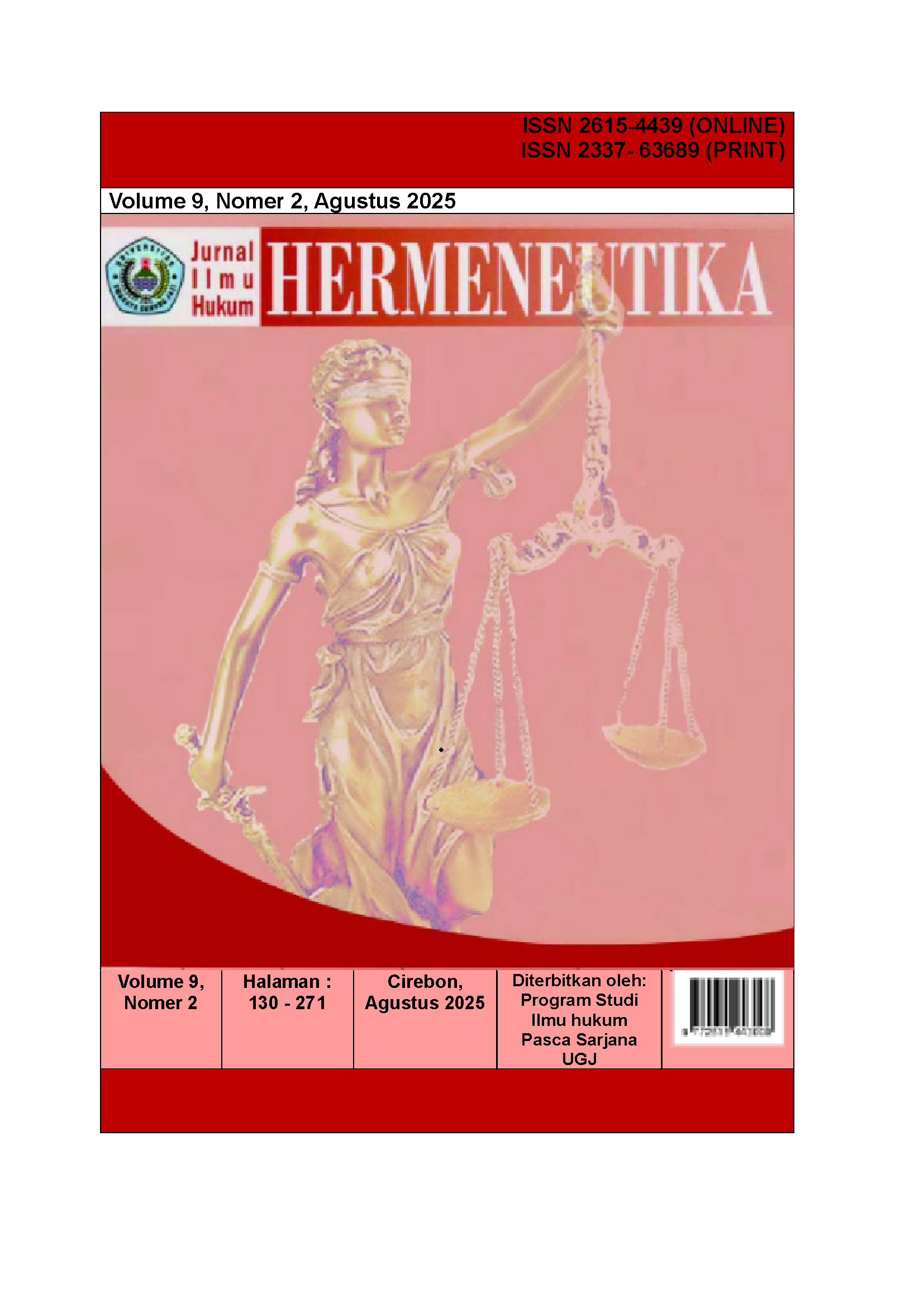Comparative Juridical Review of Gender Inequality in the Scope of Employment Law in Indonesia and South Korea
DOI:
https://doi.org/10.33603/hermeneutika.v9i2.9757Keywords:
Gender Inequality, Women's Rights, Legal ProtectionAbstract
Gender inequality in the workplace, including in terms of wages, promotions, and legal protection, is still a significant issue in many countries, including Indonesia and South Korea. This study aims to compare labor law regulations in both countries in their approach to addressing gender inequality. The research was conducted using a normative juridical method, which involved analyzing related laws and regulations, legal literature, and official documents, such as Law No. 13/2003 on Manpower in Indonesia and Namnyeo Goyong Pyeongdeung gwa Il· Gajeong Yangnip Jiwon e Gwanhan Beomnyul in South Korea. The results show that Indonesia has laws that prohibit gender-based discrimination, but women still receive lower incomes than men and face barriers in accessing leadership positions. Women's rights are not well protected, and equality and the elimination of discrimination against women are often the primary and joint focus to be implemented. On the other hand, although South Korea has more progressive regulations, such as a ban on discrimination in recruitment and promotion, gender bias in the workplace remains high due to hierarchical work cultures and social norms.
References
Act, Labor Standards. “법제처 국가법령정보센터,” no. 15108 (2024).
Akbar, Fakhriza. “Gender Wage Gap: Evidence from Employment in Informal Sector.” The Journal of Indonesia Sustainable Development Planning 3, no. 2 (2022): 104–17. https://doi.org/10.46456/jisdep.v3i2.301.
Alagappan, Anuratha. “Equal Employment Opportunity and Discrimination,” no. May (2010): 1–2.
Chatani, Kazutoshi. “Gender Pay Gaps in Indonesia Statistics : Gender Pay Gaps in Indonesia,” no. September (2020): 2. https://www.ilo.org/jakarta/whatwedo/publications/WCMS_755543/lang--en/index.htm.
Cooke, Fang Lee. “Women’s participation in employment in Asia: A comparative analysis of China, India, Japan and South Korea.” International Journal of Human Resource Management 21, no. 12 (2010): 2249–70. https://doi.org/10.1080/09585192.2010.509627.
Ekawati, Dian, dan Dadan Herdiana. “Analysis of legal protection of workers ’ rights in labor relations in Indonesia” 10, no. 5 (2024): 8–10.
ILO. “Kesenjangan Upah Berbasis Gender di Indonesia,” no. September (2020): Diakses pada 2 Desember 2021. https://www.ilo.org/wcmsp5/groups/public/---asia/---ro-bangkok/---ilo-jakarta/documents/publication/wcms_755542.pdf.
Jaeeun, Lee. “Gender pay gap in South Korea worst in OECD.” https://business.inquirer.net, 2024. https://business.inquirer.net/460274/gender-pay-gap-in-south-korea-worst-in-oecd.
Kesatu, Buku, Aturan Umum, Bab I I Pidana, Bab Iii, Hal-hal Menghapuskan, Memberatkan Pidana, Bab I V Percobaan, et al. “Hukum Pidana Bagian Khusus (KUHP Buku II Jilit I),” 1998.
Larasati, Novia Puspa Ayu. “Gender Inequality in Indonesia: Facts and Legal Analysis.” Law Research Review Quarterly 7, no. 4 (2021): 445–58. https://doi.org/10.15294/lrrq.v7i4.48170.
Nuraeni, Yeni, dan Ivan Lilin Suryono. “Analisis Kesetaraan Gender dalam Bidang Ketenagakerjaan Di Indonesia.” Nakhoda: Jurnal Ilmu Pemerintahan 20, no. 1 (2021): 68–79. https://doi.org/10.35967/njip.v20i1.134.
RI, Undang-Undang. “Undang-Undang No 23 Tahun 2004 tentang PKDRT.” Undang-Undang Nomor 23 Tahun 2004 Tentang Penghapusan Kekerasan Dalam Rumah Tangga, 2021, 1–22.
RI, “Undang-Undang Nomor 13 Tahun 2003.” RI 49, no. 0 (2003): 1-33 : 29 pag texts + end notes, appendix, referen.
RI, “Undang-Undang Republik Indonesia No. 11 Tahun 2020.” Journal of International Conference Proceedings 2, no. 3 (2020): 16–23.
Downloads
Published
Issue
Section
Citation Check
License
Copyright (c) 2025 Nafah Svadisthia Handoko

This work is licensed under a Creative Commons Attribution-ShareAlike 4.0 International License.
The Authors submitting a manuscript do so on the understanding that if accepted for publication, copyright of the article shall be assigned to Jurnal HERMENUTIKA, Sekolah Pascasarjana Ilmu Hukum. Universitas Swadaya Gunung Jati as publisher of the journal. Copyright encompasses rights to reproduce and deliver the article in all form and media, including reprints, photographs, microfilms, and any other similar reproductions, as well as translations.
Jurnal HERMENEUTIKA, Universitas Swadaya Gunung Jati and the Editors make every effort to ensure that no wrong or misleading data, opinions or statements be published in the journal. In any way, the contents of the articles and advertisements published in Jurnal HERMENEUTIKA are the sole responsibility of their respective authors and advertisers.










